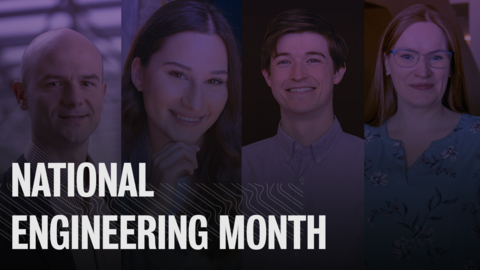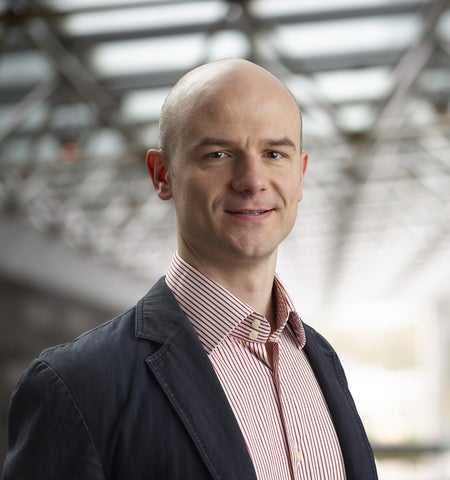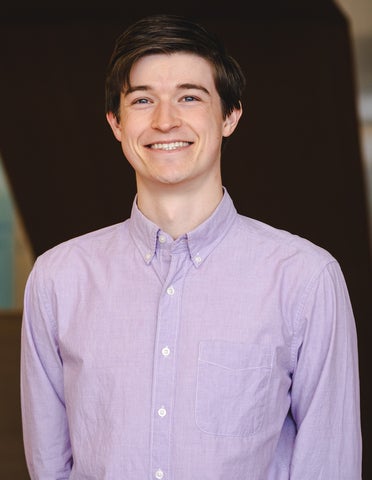
Did you know that March is National Engineering Month in Canada?
The Institute for Quantum Computing (IQC) is proud to have a multidisciplinary community comprised of scientists, engineers, and mathematicians that work side-by-side to advance the field of quantum information science and technology.
This month, IQC is celebrating engineering excellence by recognizing some of our amazing members from the University of Waterloo’s Department of Electrical and Computer Engineering. In sharing their backgrounds, research achievements, and personal experiences, we hope to highlight the important roles of engineers in quantum information science and technology and the impact that they have in our society.

Dr. Michal Bajcsy
Faculty, Institute for Quantum Computing
Professor, Department of Electrical and Computer Engineering, University of Waterloo
Dr. Michal Bajcsy joined IQC and the Department of Electrical and Computer Engineering as a professor in 2014, after earning his PhD in Applied Physics from Harvard University and working as a postdoctoral researcher in the Nanoscale and Quantum Photonics Lab at Stanford University. He also spent several years as a visiting student at Massachusetts Institute of Technology (MIT).
In Bajcsy’s Nano-Photonics and Quantum Optics Laboratory at IQC, his group of experimental researchers focuses on the development and studies of novel forms of light-matter and photon-photon interactions as well as their applications using nanophotonic structures such as photonic-crystal slabs, metasurfaces, and hollow-core optical fibers, combined with quantum emitters like laser-cooled atoms, quantum dots, and color centers in diamond. In particular, he is interested in interfacing different quantum platforms such as quantum-dot based single-photon sources with atomic quantum memories, or microwave photons from superconducting qubits with optical networks.
“Many of my research projects are based on ‘hybrid’ ideas that combine research areas which don’t traditionally overlap, such as nanophotonics, cold atoms, and machine learning.”
Besides his main research in quantum optics and nanophotonics, Bajcsy also explores the use of field-effect transistors based on doped graphene-oxide gel as biosensors capable of early detection of pathogens and biomarkers.

Dr. Katie McDonnell
Postdoctoral Fellow, Institute for Quantum Computing
Department of Electrical and Computer Engineering, University of Waterloo
Katie McDonnell attended the University of Glasgow where she earned her undergraduate degree in maths and physics, followed by her master’s degree in nanoscience at the University of Strathclyde. Preferring experimental work over theory, McDonnell then continued her research in the optics-based labs at Strathclyde, which led to earning a PhD in quantum optics and atomic physics.
At IQC, McDonnell works as a postdoctoral fellow with Dr. Michael Reimer and Dr. Michal Bajcsy on an experimental project that aims to interface cold atoms and quantum dots to create a hybrid quantum repeater, a system which divides long quantum communication distances into several smaller segments, each of which has its own unique quantum encryption. The techniques utilized in creating a hybrid repeater allow the researchers to convert the wavelengths of single photons or to store light in the atom, using the atom as a quantum memory.
“Working in quantum technologies brings people together from various disciplines, including engineering and physics, all of which are necessary to advance the field. While my background is in physics, I now conduct research in the Faculty of Engineering and bring a different set of skills to the work. It is such a wonderful opportunity for me to gain experience in engineering and to further collaborative research in quantum.”
McDonnell volunteers with IQC’s scientific outreach initiatives, having recently offered her time to teach a group of visiting high school students about quantum key distribution. She also gave a lecture on quantum computing at the University of Waterloo’s Renison University College for non-native English speakers who were interested in coming to the University of Waterloo for their studies.

Ben Jarvis-Frain
MASc Student, Institute for Quantum Computing
Department of Electrical and Computer Engineering, University of Waterloo
Ben Jarvis-Frain completed his undergraduate degree in engineering physics at McMaster University, where he established his multidisciplinary knowledge of engineering and applied physics. While earning his BEng, he focused on the areas of electrical engineering, nano-device engineering, and theoretical physics; all of which he now uses in his everyday research as a master’s student at IQC.
Jarvis-Frain's research, supervised by Dr. Christopher Wilson, looks at superconducting circuits for quantum information processing and quantum simulation. A major focus of his research is developing better ways to measure and interpret the behaviour of superconducting circuits; due to the extremely sensitive nature of these circuits, this is no straightforward task. A great deal of time is dedicated to considering each component in the experimental set ups as well as creating custom algorithms for measurement and data analysis, to both obtain observations and understand them.
“Being an engineer at the cutting edge of technology really feels like one of the most exciting jobs in the world. I get to study some of the most fascinating ideas that scientists are currently thinking about, and then go into a lab and actually bring these ideas to life.”
This year, Jarvis-Frain was awarded an Engineering Excellence Fellowship from the Faculty of Engineering at the University of Waterloo in recognition of his academic performance. He is honoured to have received this award and it has been a great help in supporting his research activities at IQC.

Sarah Odinotski
MASc Student, Institute for Quantum Computing
Department of Electrical and Computer Engineering, University of Waterloo
Sarah Odinotski earned her Honours Bachelor of Applied Science (BASc) degree in nanotechnology engineering and completed the Certificate in Co-operative Education in Research program at the University of Waterloo. In this unique program, which she recommends to any students who want to pursue work in research-focused positions, Odinotski zeroed in on the areas of microfabrication, nano-electronics, and nano-medicine. She chose nanotechnology engineering because of the creativity, problem-solving, and personal enrichment that takes place in this inspiring and interdisciplinary environment.
“I think engineering is an exciting field because it allows us to focus on creative ways that we can translate theories into practical tools which benefit society. My advice for anyone wanting to pursue engineering would be to keep an open mind and embrace your failures, because that’s where we learn the most!”
Now a master’s student in Dr. Michael Reimer’s lab, Odinotski is developing a single photon detector for biophotonic applications, a research area that combines biology and photonics to study the optical processes in natural and engineered materials. She enjoys working toward translational research that will be accessible and beneficial to the public. Shifting her career towards medical device design revealed the direct impact that lab work can have on people’s wellbeing and quality of life.
In 2021, Odinotski was named the Engineering Co-op Student of the Year at Waterloo as well as the Kitchener-Waterloo Woman of the Year in the Young Adult division. To date, Odinotski has helped design and create two point-of-care sensors; a hydrogel-based pH biosensor, for which she has a pending US Patent; as well as a cortisol biosensor, for which her design team received the Norman Esch Entrepreneurship Award. She hopes that these achievements are only the start of the impact she will have as she continues her master's degree research at IQC.

Saviez-vous que mars est le mois national du génie au Canada?
L’Institut d’informatique quantique est fier de pouvoir compter sur un réseau multidisciplinaire de scientifiques, d’ingénieurs et de mathématiciens qui travaillent main dans la main pour faire progresser le domaine de la science et de la technologie de l’information quantique.
Pour l’occasion, l’Institut souligne l’excellence en génie en mettant en vedette quelques-uns des éminents membres du Département de génie électrique et informatique de l’Université de Waterloo. En présentant leur parcours, leurs résultats de recherche et leurs expériences personnelles, nous espérons reconnaître l’apport des ingénieurs en science et technologie de l’information quantique et ses retombées sur la société.

Michal Bajcsy, Ph. D.
Professeur, Institut d’informatique quantique
Professeur, Département de génie électrique et informatique, Université de Waterloo
Michal Bajcsy est devenu professeur à l’Institut d’informatique quantique et au Département de génie électrique et informatique en 2014, après un doctorat en physique appliquée de l’Université Harvard et une carrière de chercheur postdoctoral au laboratoire de nanophotonique et de photonique quantique de l’Université Stanford. Il a également été pendant plusieurs années étudiant invité au Massachusetts Institute of Technology (MIT).
Au laboratoire de nanophotonique et d’optique quantique qu’il dirige à l’Institut, un groupe de recherche expérimentale se penche sur la mise au point et l’étude de nouvelles formes d’interactions lumière-matière et photon-photon ainsi que sur leurs applications à l’aide de structures nanophotoniques comme des plaques de cristal photonique, des métasurfaces et des fibres optiques à âme creuse, combinées avec des émetteurs quantiques comme des atomes refroidis au laser, des points quantiques et des centres colorés dans le diamant. Il s’intéresse notamment à l’interface de diverses plateformes quantiques comme celle de sources à photon unique à base de points quantiques avec des mémoires atomiques quantiques ou de photons micro-ondes de qubits supraconducteurs avec des réseaux optiques.
« Bon nombre de mes projets de recherche sont le fruit d’une idée “hybride” convoquant des domaines non traditionnellement apparentés, comme la nanophotonique, les atomes froids et l’apprentissage machine. »
Outre son principal sujet de recherche en optique quantique et nanophotonique, le chercheur explore également l’utilisation de transistors à effet de champ basés sur l’utilisation de gels infusés d’oxyde de graphène comme biocapteurs capables de dépister les pathogènes et biomarqueurs de manière précoce.

Katie McDonnell, Ph. D.
Stagiaire postdoctorale, Institut d’informatique quantique
Département de génie électrique et informatique, Université de Waterloo
Katie McDonnell étudiait à l’Université de Glasgow lorsqu’elle a décroché son baccalauréat en mathématiques et en physique; elle a ensuite obtenu une maîtrise en nanoscience à l’Université de Strathclyde. Femme de terrain avant d’être théoricienne, elle a poursuivi sa recherche aux laboratoires d’optique de Strathclyde, ce qui l’a conduit à obtenir un doctorat en optique quantique et en physique atomique.
À l’Institut, la chercheure travaille comme stagiaire postdoctorale avec les professeurs Michael Reimer et Michal Bajcsy sur un projet expérimental qui vise à interfacer des atomes froids et des points quantiques pour créer un répéteur quantique hybride, un système qui divise les longues distances de communication quantique en plusieurs petits segments ayant leur propre cryptage. Les techniques employées au cours de ce projet ont permis aux chercheurs de convertir les longueurs d’onde de photons uniques ou d’emmagasiner la lumière dans l’atome, en utilisant ce dernier comme une mémoire quantique.
« Le domaine des technologies quantiques rassemble des gens issus de diverses disciplines, y compris le génie et la physique, qui sont toutes essentielles au progrès du domaine. J’ai surtout œuvré en physique, mais je dirige actuellement la recherche à la Faculté de génie et mon expérience me permet d’y apporter une couleur différente. C’est une occasion en or pour moi d’acquérir de l’expérience en génie et de faire avancer la recherche collaborative en quantique. »
Katie McDonnell participe bénévolement aux initiatives de vulgarisation scientifique de l’Institut d’informatique quantique; elle a récemment enseigné bénévolement la distribution quantique de clé à un groupe de visiteurs du secondaire. Elle a aussi donné une conférence sur l’informatique quantique au Renison University College de l’Université de Waterloo à des étudiants potentiels dont l’anglais n’était pas la première langue.

Ben Jarvis-Frain
Étudiant à la maîtrise, Institut d’informatique quantique
Département de génie électrique et informatique, Université de Waterloo
Ben Jarvis-Frain a obtenu son baccalauréat en génie physique à l’Université McMaster, où il a établi son savoir multidisciplinaire en génie et en physique appliquée. Au cours de ses études, il s’est concentré sur les domaines du génie électrique, du génie des dispositifs nanométriques et de la physique théorique, des connaissances qui lui sont aujourd’hui bien utiles dans ses recherches à la maîtrise à l’Institut.
Les travaux de l’étudiant, dirigés par le professeur Christopher Wilson, portent sur les circuits supraconducteurs pour le traitement de l’information et la simulation quantiques. Un des grands axes de sa recherche consiste à élaborer de meilleures méthodes pour mesurer et interpréter le comportement des circuits supraconducteurs; et vu la nature extrêmement sensible de ces circuits, ce n’est pas une mince tâche! Une bonne partie de son travail est consacré à considérer chaque élément des expériences ainsi qu’à créer des algorithmes personnalisés pour la mesure et l’analyse de données. Le but? Recueillir des observations et les comprendre.
« Ingénieur à la fine pointe de la technologie : j’ai du mal à imaginer un emploi plus intéressant. J’ai la chance d’étudier quelques-unes des idées les plus fascinantes en science actuellement, puis d’aller en laboratoire pour les concrétiser. »
Cette année, le corps professoral de l’école de génie de l’Université de Waterloo lui a décerné une bourse d’excellence en génie pour souligner sa performance universitaire. C’est pour lui un honneur d’avoir reçu cette récompense, qui lui donne un bon coup de pouce dans ses activités de recherche à l’Institut d’informatique quantique.

Sarah Odinotski
Étudiante à la maîtrise, Institut d’informatique quantique
Département de génie électrique et informatique, Université de Waterloo
Sarah Odinotski a obtenu son baccalauréat en sciences appliqué spécialisé en génie nanotechnologique et effectué un certificat en recherche, régime coopératif à l’Université de Waterloo. Dans ce programme unique, qu’elle recommande aux étudiants qui s’orientent vers la recherche professionnelle, la chercheuse s’est concentrée sur les domaines de la microfabrication, de la nanoélectronique et de la nanomédecine. Son choix s’est arrêté sur le génie nanotechnologique en raison de la créativité, de la recherche de solutions et de l’enrichissement personnel qui caractérisent ce milieu interdisciplinaire inspirant.
« Je crois que le génie est un domaine intéressant, car il nous permet de nous concentrer sur des façons créatives de passer de la théorie à des outils pratiques aux retombées sociales utiles. Mon conseil pour celles et ceux qui souhaitent se diriger dans cette branche? Gardez l’esprit ouvert et reconnaissez vos erreurs, car c’est ainsi que l’on apprend le plus! »
Aujourd’hui, Sarah Odinotski est étudiante à la maîtrise au laboratoire du professeur Michael Reimer; elle conçoit un détecteur de photon unique utilisé en biophotonique, un domaine de recherche qui combine biologie et photonique pour étudier les processus optiques dans des matériaux naturels et artificiels. Elle aime travailler en recherche translationnelle pour produire des résultats accessibles et bénéfiques pour le public. En réorientant sa carrière vers la conception d’appareils médicaux, elle a compris toute la portée du travail de laboratoire dans le bien-être et la qualité de vie des gens.
En 2021, elle a été nommée étudiante en génie au régime coopératif de l’année à l’Université de Waterloo ainsi que femme de l’année Kitchener-Waterloo dans la catégorie jeune adulte. Jusqu’à maintenant, elle a contribué à la conception et à la création de deux capteurs au point d’intervention : un biocapteur de pH à base d’hydrogel, pour lequel elle attend un brevet américain, ainsi qu’un biocapteur de cortisol, pour lequel l’équipe de conception s’est vu décerner le prix d’entrepreneuriat Norman-Esch. Elle espère que ces réussites marquent le début d’une carrière florissante qui s’amorce avec sa maîtrise à l’Institut d’informatique quantique.